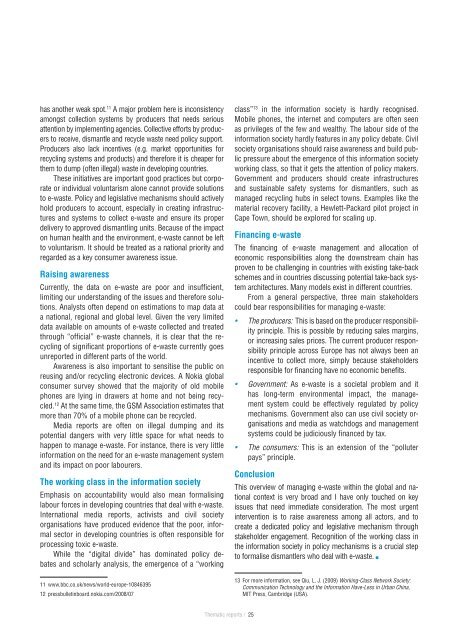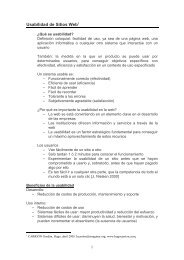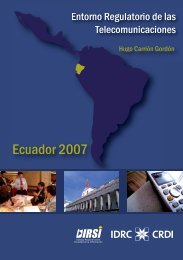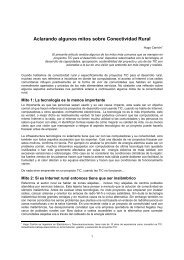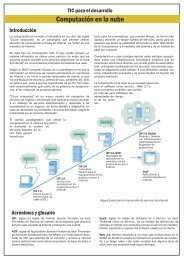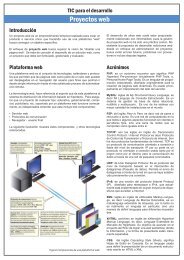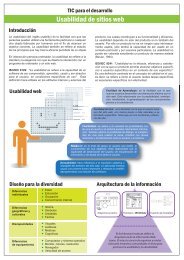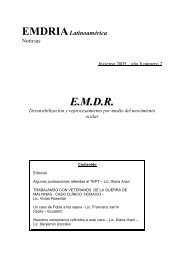GLOBAL INFORMATION SOCIETY WATCH 2010
GLOBAL INFORMATION SOCIETY WATCH 2010
GLOBAL INFORMATION SOCIETY WATCH 2010
You also want an ePaper? Increase the reach of your titles
YUMPU automatically turns print PDFs into web optimized ePapers that Google loves.
has another weak spot. 11 A major problem here is inconsistency<br />
amongst collection systems by producers that needs serious<br />
attention by implementing agencies. Collective efforts by producers<br />
to receive, dismantle and recycle waste need policy support.<br />
Producers also lack incentives (e.g. market opportunities for<br />
recycling systems and products) and therefore it is cheaper for<br />
them to dump (often illegal) waste in developing countries.<br />
These initiatives are important good practices but corporate<br />
or individual voluntarism alone cannot provide solutions<br />
to e‐waste. Policy and legislative mechanisms should actively<br />
hold producers to account, especially in creating infrastructures<br />
and systems to collect e‐waste and ensure its proper<br />
delivery to approved dismantling units. Because of the impact<br />
on human health and the environment, e‐waste cannot be left<br />
to voluntarism. It should be treated as a national priority and<br />
regarded as a key consumer awareness issue.<br />
Raising awareness<br />
Currently, the data on e‐waste are poor and insufficient,<br />
limiting our understanding of the issues and therefore solutions.<br />
Analysts often depend on estimations to map data at<br />
a national, regional and global level. Given the very limited<br />
data available on amounts of e‐waste collected and treated<br />
through “official” e‐waste channels, it is clear that the recycling<br />
of significant proportions of e‐waste currently goes<br />
unreported in different parts of the world.<br />
Awareness is also important to sensitise the public on<br />
reusing and/or recycling electronic devices. A Nokia global<br />
consumer survey showed that the majority of old mobile<br />
phones are lying in drawers at home and not being recycled.<br />
12 At the same time, the GSM Association estimates that<br />
more than 70% of a mobile phone can be recycled.<br />
Media reports are often on illegal dumping and its<br />
potential dangers with very little space for what needs to<br />
happen to manage e‐waste. For instance, there is very little<br />
information on the need for an e‐waste management system<br />
and its impact on poor labourers.<br />
The working class in the information society<br />
Emphasis on accountability would also mean formalising<br />
labour forces in developing countries that deal with e‐waste.<br />
International media reports, activists and civil society<br />
organisations have produced evidence that the poor, informal<br />
sector in developing countries is often responsible for<br />
processing toxic e‐waste.<br />
While the “digital divide” has dominated policy debates<br />
and scholarly analysis, the emergence of a “working<br />
11 www.bbc.co.uk/news/world-europe-10846395<br />
12 pressbulletinboard.nokia.com/2008/07<br />
class” 13 in the information society is hardly recognised.<br />
Mobile phones, the internet and computers are often seen<br />
as privileges of the few and wealthy. The labour side of the<br />
information society hardly features in any policy debate. Civil<br />
society organisations should raise awareness and build public<br />
pressure about the emergence of this information society<br />
working class, so that it gets the attention of policy makers.<br />
Government and producers should create infrastructures<br />
and sustainable safety systems for dismantlers, such as<br />
managed recycling hubs in select towns. Examples like the<br />
material recovery facility, a Hewlett-Packard pilot project in<br />
Cape Town, should be explored for scaling up.<br />
Financing e-waste<br />
The financing of e-waste management and allocation of<br />
economic responsibilities along the downstream chain has<br />
proven to be challenging in countries with existing take-back<br />
schemes and in countries discussing potential take-back system<br />
architectures. Many models exist in different countries.<br />
From a general perspective, three main stakeholders<br />
could bear responsibilities for managing e‐waste:<br />
• The producers: This is based on the producer responsibility<br />
principle. This is possible by reducing sales margins,<br />
or increasing sales prices. The current producer responsibility<br />
principle across Europe has not always been an<br />
incentive to collect more, simply because stakeholders<br />
responsible for financing have no economic benefits.<br />
• Government: As e-waste is a societal problem and it<br />
has long-term environmental impact, the management<br />
system could be effectively regulated by policy<br />
mechanisms. Government also can use civil society organisations<br />
and media as watchdogs and management<br />
systems could be judiciously financed by tax.<br />
• The consumers: This is an extension of the “polluter<br />
pays” principle.<br />
Conclusion<br />
This overview of managing e-waste within the global and national<br />
context is very broad and I have only touched on key<br />
issues that need immediate consideration. The most urgent<br />
intervention is to raise awareness among all actors, and to<br />
create a dedicated policy and legislative mechanism through<br />
stakeholder engagement. Recognition of the working class in<br />
the information society in policy mechanisms is a crucial step<br />
to formalise dismantlers who deal with e‐waste. n<br />
13 For more information, see Qiu, L. J. (2009) Working-Class Network Society:<br />
Communication Technology and the Information Have-Less in Urban China,<br />
MIT Press, Cambridge (USA).<br />
Thematic reports / 25


